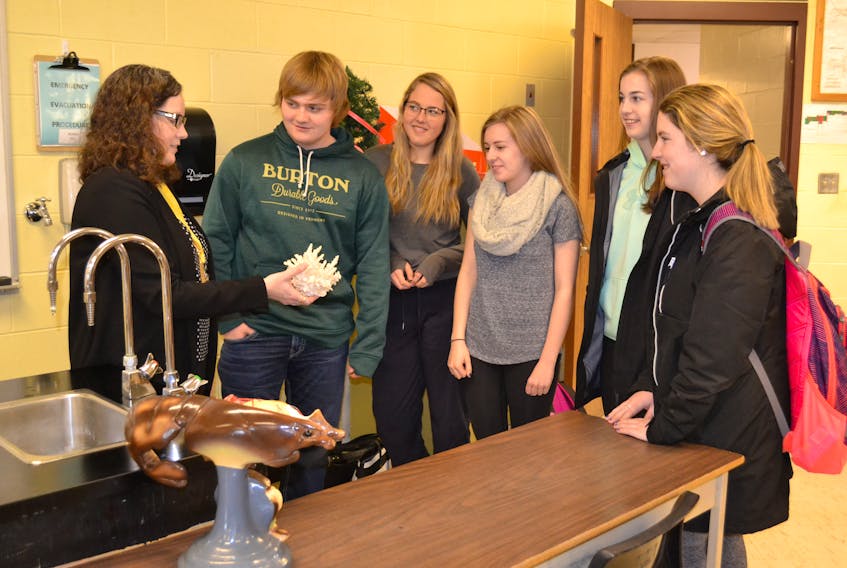ELMSDALE
The impact of climate change goes far beyond rising sea levels, a Dalhousie University professor shared with Westisle Composite High School students on
Tuesday.
Dr. Sarah Stewart-Clark, associate professor of Shellfish Aquaculture in the university’s Department of Animal Science and Aquaculture, is conducting research on oysters and mussels for the P.E.I. Aquaculture Association. She explained there are several other forces at play, too, including a lowering salinity level, rising water temperature and heightened pH, or acidity, levels.
One of the most serious, she said, is acidification. It’s largely caused by an overabundance of carbon dioxide, some of it from the burning of fossil fuels, being released into the atmosphere and subsequently getting absorbed into the world’s oceans. Clark explained the carbon dioxide changes the chemistry of the water and causes it to become more acidic. She played a video which noted the acid levels in the oceans have increased 25 to 30 per cent in the last 250 years.
“If you’re a marine organism, the salinity, the temperature and the pH of the water have a big impact on whether you can live, whether you will be healthy, and whether you can no longer survive in this area.
“So, having all three of these things change is a very significant event in a short length of time.”
How that is relevant to Dr. Clark’s research is that high acidity levels can interfere with or delay the shell formation of shellfish, especially in the larval stage of their development.
She told of lab experiments being conducted on lobster larvae mimicking the acidity levels expected to be present around mid-century.
“After 40 days, the larvae had shorter carapace length. The larvae grew at a lower rate. It took a longer time to reach molts one through four and, so that means they are spending more time in the water column where they can be consumed by anything that’s present.
“So, that’s concerning. Slower progress through those molt stages leaves them very vulnerable.”
Losing young-of-year lobster, because of extended time in the water column, could negatively impact the value of Canada’s most valuable fishery, she told the students.
Some of her research seeks to identify species of oyster and mussels that can adapt to the changing conditions.
During her presentation, Clark mentioned how various species are moving towards the poles as ocean temperatures rise. She told of a shellfish grower in Nova Scotia showing her a picture and asking her what the species was. It was an aqueous tubeworm never before known to be found north of Maine.
While the impact of climate change is being felt to a greater extent in other parts of the world, such as in the Pacific and Arctic oceans, Clark said local jurisdictions need to prepare for the inevitable. It’s good, she said, that public planners are taking rising sea levels into consideration when planning new infrastructure, but she said it has to go further.
“We kind of rely on our fishing and farming industries to just always be there and, I think, if we want them to always be there, we have to invest in science and technology in figuring out how to allow these sectors to continue to be the economic drivers,” she said.
“P.E.I. is my home,” she added, “and I understand the significance of these sectors and I can perceive the economic instability that can occur if we don’t plan now for the changes that are coming.”









